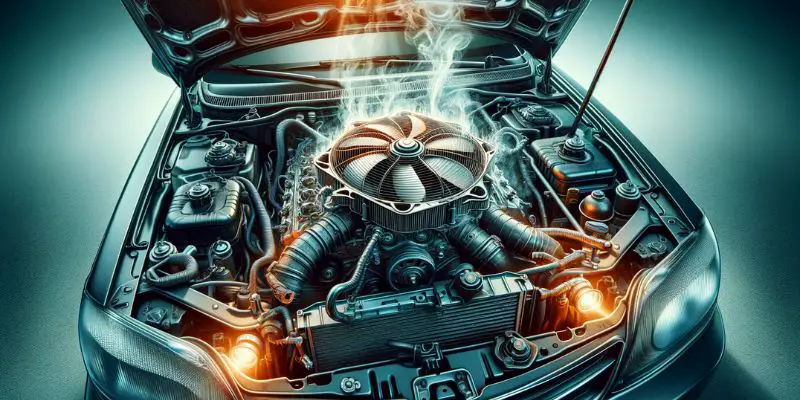As a car enthusiast, I’ve often encountered a faulty radiator fan.
This is a critical issue, as the radiator fan plays a key role in your vehicle’s cooling system.
Here is what happens if your radiator fan stops working:
When a radiator fan stops working, it leads to engine overheating, increased wear and tear, reduced fuel efficiency, damage to the catalytic converter, compromised A/C performance, engine knocking, warped cylinder heads, electrical system strain, reduced engine life, and safety risks.
Let me guide you through the 10 most significant consequences of a non-functional radiator fan.
10 Worst Things That Happen During Radiator Fan Failure

When your radiator fan fails, it’s not just a minor inconvenience.
It’s a domino effect that impacts various aspects of your vehicle’s performance and longevity. Here’s a detailed look at each of these impacts.
1. Overheating Engine
The most immediate and obvious effect of a failed radiator fan is an overheating engine.
The fan’s primary function is to enhance airflow over the radiator, which helps in cooling the engine coolant as it passes through.
Without this airflow, the coolant’s temperature rises, causing the engine to overheat.
This can lead to a range of problems, from minor inefficiencies to severe engine damage.
In my experience, an overheating engine is the first red flag that indicates a possible radiator fan issue.
2. Increased Wear and Tear
An overheating engine doesn’t just risk immediate damage.
Over time, the excessive heat can accelerate the wear and tear on various engine components.
Components like gaskets, seals, and hoses are particularly vulnerable to high temperatures.
If these parts fail, it can lead to coolant leaks, reduced engine performance, and ultimately, more frequent and costly repairs.
3. Reduced Fuel Efficiency
When the engine operates at higher temperatures, it becomes less efficient.
The engine’s management system tries to compensate for the overheating by altering the fuel-air mixture, often leading to richer mixtures that consume more fuel.
As a result, you’ll notice a decrease in miles per gallon, hitting your wallet every time you fill up the tank.
4. Potential Damage to the Catalytic Converter
The catalytic converter, a critical component of the exhaust system, can suffer from the increased temperatures due to a failed radiator fan.
The converter works best within a specific temperature range.
Too hot, and it can become clogged, less efficient, or even damaged.
Replacing a catalytic converter is not cheap, and it’s a repair you want to avoid.
5. Compromised Air Conditioning Performance
In most vehicles, the efficiency of the air conditioning system is closely linked to the engine’s cooling system.
When the radiator fan isn’t working, the A/C system can’t dissipate heat as effectively, leading to poorer performance.
On a hot day, you’ll find that your car’s interior doesn’t cool down as quickly or as efficiently as it should.
6. Engine Knocking
Engine knocking, also known as detonation, can occur when the engine runs too hot.
This phenomenon happens when the fuel in the engine’s cylinders ignites prematurely.
It’s a serious issue that can lead to engine damage if not addressed promptly. A faulty radiator fan, by causing the engine to overheat, increases the risk of engine knocking.
7. Warped Cylinder Heads
The cylinder head, made of metal, can warp due to the excessive heat caused by a failing radiator fan.
A warped cylinder head will lead to poor engine compression, causing a range of issues from misfires to significant power loss.
Repairing or replacing a cylinder head is a complex and costly process.
8. Electrical System Strain
Many modern vehicles have sophisticated electrical systems that monitor and respond to engine temperature.
If the radiator fan stops working, the system may increase the load on other cooling components like secondary fans or coolant pumps.
This additional strain can lead to premature wear or failure of these components, leading to more extensive electrical system issues.
9. Reduced Engine Life
The cumulative effect of all these issues is a significant reduction in the overall life of your engine.
Consistent overheating and the associated stress on engine components can drastically shorten the lifespan of your engine.
This leads to either costly repairs or the need for a full engine replacement sooner than expected.
10. Safety Risks
Finally, driving with an overheated engine is a safety risk.
An engine that’s too hot can suddenly fail, leaving you stranded on the road or even causing a road accident.
The risk of fire in the engine bay, while rare, is also a potential hazard when the engine overheats consistently.
Radiator Fan Stops Working But Not Overheating
When your radiator fan stops working, it’s common to expect overheating.
However, there might be situations where your car doesn’t overheat immediately.
This can be misleading, as it doesn’t mean your vehicle is operating safely. Here’s what might be happening:
- Efficient Cooling at High Speeds: At high speeds, enough air flows through the radiator naturally, compensating for the non-functional fan. This can temporarily prevent overheating.
- Cooler Ambient Temperatures: In cooler weather, the engine may not require as much cooling, delaying the overheating process.
- Engine Running Under Less Strain: If you’re driving gently without putting much load on the engine, it may not produce as much heat, reducing the need for active cooling.
- Backup Cooling Systems: Some vehicles have secondary cooling methods, like additional fans or enhanced coolant circulation, which might temporarily take over the cooling process.
Can I Drive My Car If The Fan Is Not Working
Driving a car with a non-functional radiator fan is a risk, even if your vehicle isn’t currently overheating.
Here are some points to consider:
- Short Trips Might Be Okay: For very short distances or in emergency situations, you might get away with driving without a working fan, especially in cooler conditions.
- Risk of Sudden Overheating: Even if the car isn’t overheating immediately, it could start to overheat unexpectedly, especially under more strenuous conditions like heavy traffic or hot weather.
- Potential for Long-term Damage: Continuously driving without a working fan can lead to gradual damage to your engine and associated components, even if there are no immediate overheating symptoms.
- Safety Concerns: There’s always a safety risk involved in driving a vehicle that’s not operating correctly. Overheating can occur suddenly and may cause the engine to fail at a critical moment.
In both scenarios, it’s vital to be aware of the potential risks and limitations of driving without a functional radiator fan.
Even if immediate symptoms like overheating are not present, the long-term health of your vehicle could be at stake.
How Do I Know If My Radiator Fan Is Bad?
Identifying a faulty radiator fan is key to maintaining your vehicle’s health.
Here are some indicators:
- Overheating Engine: The most obvious sign is an overheating engine, especially during idle or low-speed driving.
- No Sound or Movement from the Fan: If you don’t hear the fan kick in or see it spin when the engine reaches operating temperature, it’s a clear sign.
- Error Codes: Modern vehicles might display an error code or check engine light if there’s a problem with the cooling system.
- Physical Damage: Visibly damaged blades or wiring are definite indicators of a problem.
- Inconsistent Cooling Performance: If your car cools down at speed but overheats at a standstill, it could point to a fan issue.
What to Do If Your Radiator Fan Is Not Working
When you discover that your radiator fan isn’t working, it’s crucial to address the issue promptly to avoid engine damage.
Here are steps to follow:
- Stop Driving and Check the Fan: If you notice any signs of overheating or know that your radiator fan is malfunctioning, stop driving as soon as it’s safe to do so. Inspect the fan for any visible signs of damage.
- Check the Fuse and Relay: Often, the issue could be as simple as a blown fuse or a faulty relay. Locate your vehicle’s fuse box and check the fuse and relay corresponding to the radiator fan.
- Inspect Wiring and Connections: Look for any loose connections or damaged wires leading to the radiator fan. Electrical issues are common culprits.
- Consult a Professional: If the problem isn’t immediately apparent or fixable, take your vehicle to a mechanic. Driving with a non-functional fan can lead to more serious issues.
- Consider the Environment: If you’re in a hot climate or stuck in traffic, the need for a functioning fan is more urgent. In cooler conditions and open roads, you might have a bit more time before the engine overheats, but it’s still a risk.
Check out this video about how to fix a radiator fan (aka cooling fan) that’s not working:
How Much Does It Cost to Fix a Radiator Fan?
On average, you might expect to pay anywhere from $100 for minor repairs to $500-$1,000 (or more) for major fixes, including parts and labor.
It’s always a good idea to get a few quotes from different mechanics to ensure you’re getting a fair price.
The cost of fixing a radiator fan can vary widely based on several factors:
- Type of Repair: Simple issues like a blown fuse or relay are inexpensive fixes, while replacing the entire fan assembly is more costly.
- Vehicle Make and Model: Some cars have more complex cooling systems or parts that are more expensive to replace.
- Labor Costs: Depending on where you live and the mechanic you choose, labor costs can vary significantly.
- Parts Availability: If parts are readily available and not overly expensive, the overall cost will be lower. For older or more exotic vehicles, parts might be harder to find and more expensive.
- Urgency of the Repair: If you need an immediate fix, it might cost more, especially if you require emergency or after-hours service.
Final Thoughts: What Happens If Your Radiator Fan Stops Working?
Think of your radiator fan as the unsung hero of your engine’s blockbuster saga – without it, there’s no cool ending (That was so cheesy I feel the instant need to apologize).
We have more good articles about radiator fans (and other fans), so check out the shortlist below before you go.
Read This Next:
- Should a Radiator Fan Turn On When AC Is On? (Must Know)
- How to Check If Your Radiator Fan Is Working (10 Best Ways)
- Why Is My Car Fan So Loud? (13 Reasons and Solutions)
- 4 Common Problems With Cars in the Cold (Solved & Explained)
